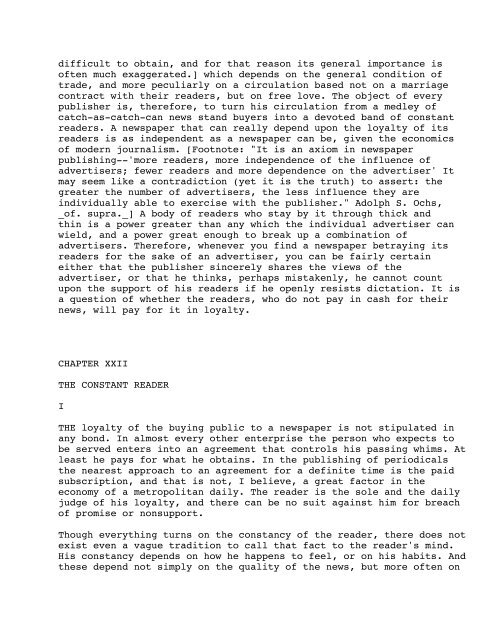PUBLIC OPINION by WALTER LIPPMANN TO FAYE LIPPMANN ...
PUBLIC OPINION by WALTER LIPPMANN TO FAYE LIPPMANN ...
PUBLIC OPINION by WALTER LIPPMANN TO FAYE LIPPMANN ...
You also want an ePaper? Increase the reach of your titles
YUMPU automatically turns print PDFs into web optimized ePapers that Google loves.
difficult to obtain, and for that reason its general importance is<br />
often much exaggerated.] which depends on the general condition of<br />
trade, and more peculiarly on a circulation based not on a marriage<br />
contract with their readers, but on free love. The object of every<br />
publisher is, therefore, to turn his circulation from a medley of<br />
catch-as-catch-can news stand buyers into a devoted band of constant<br />
readers. A newspaper that can really depend upon the loyalty of its<br />
readers is as independent as a newspaper can be, given the economics<br />
of modern journalism. [Footnote: "It is an axiom in newspaper<br />
publishing--'more readers, more independence of the influence of<br />
advertisers; fewer readers and more dependence on the advertiser' It<br />
may seem like a contradiction (yet it is the truth) to assert: the<br />
greater the number of advertisers, the less influence they are<br />
individually able to exercise with the publisher." Adolph S. Ochs,<br />
_of. supra._] A body of readers who stay <strong>by</strong> it through thick and<br />
thin is a power greater than any which the individual advertiser can<br />
wield, and a power great enough to break up a combination of<br />
advertisers. Therefore, whenever you find a newspaper betraying its<br />
readers for the sake of an advertiser, you can be fairly certain<br />
either that the publisher sincerely shares the views of the<br />
advertiser, or that he thinks, perhaps mistakenly, he cannot count<br />
upon the support of his readers if he openly resists dictation. It is<br />
a question of whether the readers, who do not pay in cash for their<br />
news, will pay for it in loyalty.<br />
CHAPTER XXII<br />
THE CONSTANT READER<br />
I<br />
THE loyalty of the buying public to a newspaper is not stipulated in<br />
any bond. In almost every other enterprise the person who expects to<br />
be served enters into an agreement that controls his passing whims. At<br />
least he pays for what he obtains. In the publishing of periodicals<br />
the nearest approach to an agreement for a definite time is the paid<br />
subscription, and that is not, I believe, a great factor in the<br />
economy of a metropolitan daily. The reader is the sole and the daily<br />
judge of his loyalty, and there can be no suit against him for breach<br />
of promise or nonsupport.<br />
Though everything turns on the constancy of the reader, there does not<br />
exist even a vague tradition to call that fact to the reader's mind.<br />
His constancy depends on how he happens to feel, or on his habits. And<br />
these depend not simply on the quality of the news, but more often on





